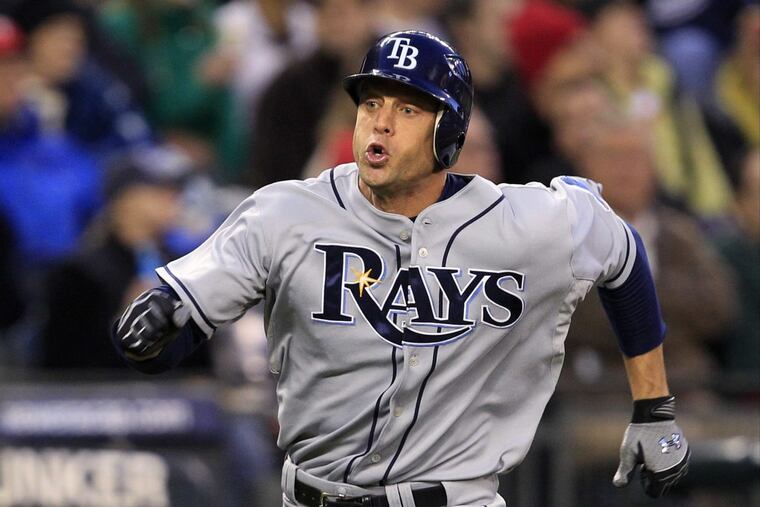Phillies hire new-age thinker as manager | Marcus Hayes
The Phillies will reportedly hire forward-thinking dugout neophyte Gabe Kapler as manager.

It's never a bad idea to hire the smartest guy in the room. That's what Gabe Kapler seems to be.
The Phillies announced Monday that Kapler, one of the architects of the Dodgers' success, will be their new manager. It is a headlong commitment to analytics and sports science — and an utter disregard for dugout experience.
Maybe that's OK.
The other men coaching in town — Brett Brown, Doug Pederson, and Dave Hakstol — all are data-driven leaders in charge of young teams with emerging talent, but none had pro head-coaching experience when hired. Reach back a little further and consider deposed geniuses Chip Kelly and Sam Hinkie, newcomers to their jobs who dragged the Eagles and Sixers into the 21st century. Both franchises are better for it. Process equals progress.
Kapler does not have a World Series ring as a manager, as John Farrell and Joe Girardi do, but he has no old-school baggage, either, and brings absolutely no expectations. The Phillies have averaged fewer than 70 wins the last five seasons. They won't be much better any time soon. Kapler at least makes them more interesting.
He played 12 seasons in the major leagues, plus one in Japan. He retired after 2006, managed Red Sox affiliate Greenville (S.C.) in Class A in 2007, then un-retired and played three more seasons in the majors. He has since worked as a scout and a TV analyst, and since 2014 he has been brains behind the Dodgers' peerless player development department. He did not, however, impress the Dodgers enough for them to hire him in 2015, when they chose Dave Roberts, who had six years of coaching experience in the majors. There's no shame in having lost out to Roberts, who is the reigning National League manager of the year and has his team in the World Series.
Clearly, the Phillies cared more about philosophical congruence than instructional pedigree.
The hiring of Kapler by a notoriously nepotistic organization sent a clear message about the new regime's lack of regard for taking care of the family. They passed over triple-A manager Dusty Wathan, who, since 2007, has managed every level in the club's farm system, and therefore has nurtured most of the promising Phillies players. Wathan's father, John, played and managed in the majors. His brother, Derek, played in the minors. Wathan, 44, is the ultimate Baseball Man.
Kapler, 42, is the ultimate New World Man.
He considers analytics a catechism of baseball, and as a player, he was an early convert. He neatly fits the cyber-profile created by owner John Middleton, president Andy MacPhail, and 37-year-old general manager Matt Klentak: eager to curate any calculus that creates even the smallest advantage, keen to lean on sports science to create a more complete player.
A nutrition guru and fitness nut, Kapler organically molded the Dodgers organization in his own underwear-model image. Visit kaplifestyle.com — he's a fine writer — and read his ideas about dietary discipline, communication strategies, and mindfulness.
The question: Can he incorporate these strategies and meditations into an effective managing style? Can he interact in the dugout and the clubhouse with the coolness he endorses in his essays?
Because that's what managers do. They manage. Larry Bowa is a brilliant baseball man. Charlie Manuel is the winningest manager in Phillies history. It's a tricky job.
That's because a manager's task involves much more than just making decisions from a hole in the ground between 7 and 10:30 p.m. It's 250 days of tiresome routine, of seeing the same 40 men (players, coaches, and support staff) whose immediate future you control. For 12 hours a day, sometimes more, you are the final arbiter over bullpen sessions and stretching routines and batting-practice groups and grudges. You deal with their pettiness and moodiness, their sorrows and joys, to a greater degree than any coach in any sport.
Occasionally, it can be exhilarating. Always, it is exhausting. The spotlight can be brutal in a Northeast city. Kapler is a Hollywood baby, but he knows, having won a World Series in 2004 with the Red Sox, that it's harder to escape the madness on the East Coast than on the West. Wildwood ain't Malibu.
There's a game every day, so you get reviewed every day — by the GM, the president, and the owner; by millions of fans; and by dozens of reporters. It can get tedious, especially with that last group.
The good news for the Phillies is that if Kapler doesn't immediately succeed, he can grow with the team as it rebuilds. Yes, there are a few intriguing players, but there's a lot of Processing left to do at Citizens Bank Park. It will take years for them to become relevant.
By then, we'll know if Kapler's the right man to make decisions about pitching changes and double switches, and bunts (no) and pitchouts (no) and steals (maybe).
By then, he'll have earned his seat, or he'll have lost it.